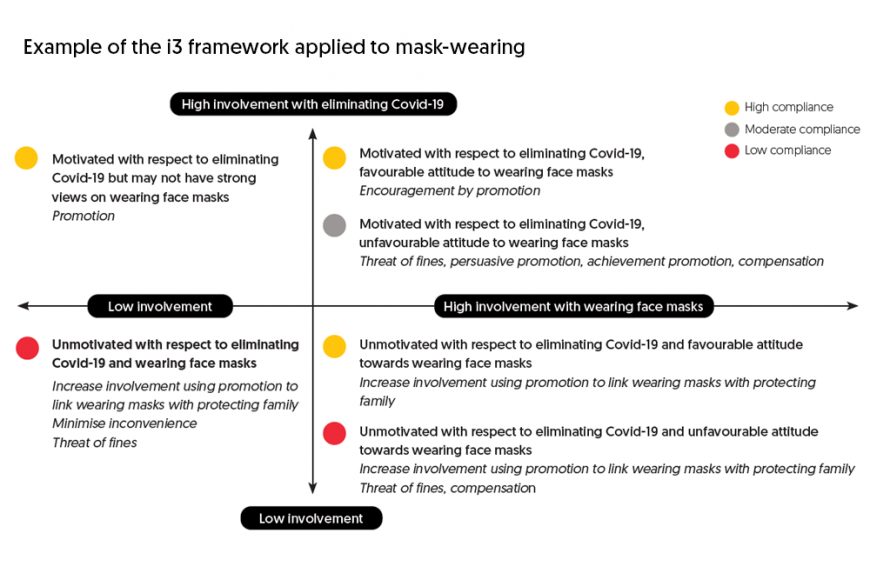At Manaaki Whenua, for example, researchers Rachelle Binny and Audrey Lustig turned their skills in the mathematical modelling of predator spread to the epidemiology of COVID-19, as reported in Putaiao issue 3, August 2020. More recently, our social researchers have adapted their understanding of decision-making in environmental management to predict likely compliance with public health directives, and our economists have assessed the economic impacts on businesses of government policies aimed at reducing the spread of Covid-19.
Public health and personal engagement
Government policy often requires people to think and act differently, but achieving meaningful behaviour change in practice is difficult. In several recent pieces of work to understand compliance with health measures during COVID-19, Dr Geoff Kaine and other social scientists at Manaaki Whenua have undertaken surveys of the public and applied the findings using the I3 compliance framework. I3 is a tool that analyses how strongly people are involved with, or care about, policy outcomes and related policy measures such as regulations, to predict whether they will comply with the measures. It also measures what they believe about policy outcomes and policy measures.
The involvement component of the I3 framework shows whether someone is willing, or not, to do something (for example, get vaccinated), and the belief component explains why they are willing, or not. The researchers have applied I3 to several different aspects of people’s behaviour in reaction to public health measures: willingness to be vaccinated, compliance with mask-wearing, use of the contact tracing app, willingness to be tested for COVID-19, and self-isolation.
The finding that people’s willingness, for instance to be vaccinated, depends on involvement (motivation) as well as attitude has important implications for the design of policy measures, for instance to promote high vaccination rates. It is important to distinguish between those with a lack of interest in getting vaccinated and those who strongly oppose vaccination and therefore deliberately choose not to be vaccinated, and to tailor incentive and enforcement strategies appropriately.
The findings of each survey also have important implications for the design of promotional programmes intended to encourage the participation of the community in mass vaccination programmes. The findings also highlight the difficulty of communicating effectively through mass media with those who have little interest (low involvement) in preventing the spread of COVID-19.

Example of the i3 framework applied to mask-wearing
Public health and financial health
In other COVID-related work, Drs Kenny Bell and Maksym Polyakov used GST data and other government datasets to measure the financial effects on businesses of non-pharmaceutical interventions to reduce the spread of Covid-19 in Aotearoa New Zealand, by comparing the revenues and expenses of businesses during the periods of restrictions to those that would have been expected if the pandemic had not happened. Nationally, the introduction of Alert Level 4 in April 2020 was associated with a 60% reduction in revenue (48% when controlling for expenses), recovering to normal by September 2020 (the end of the study period). Auckland, Otago, and Nelson were the regions most affected, while the worst-hit sectors were ‘Accommodation and Food Services’, ‘Arts and Recreation Services’, ‘Retail Trade’, and ‘Construction’.
This research is a key contribution to evaluating COVID-19 related government policies and estimating the potential longer-term impacts of the pandemic. Its innovative use of financial data recalls earlier work by Dr Bell in conjunction with the Deep South Challenge on the effects on future drought on farm incomes, which compared farm tax returns with temperature and soil moisture data (see Putaiao issue 7, August 2021).
“Analyses like ours open the door to the possibility of more targeted income support for businesses and workers,” says Dr Bell. “The next time we face restrictions like we did in 2020, our work may help target spending at those businesses that need it most.”
